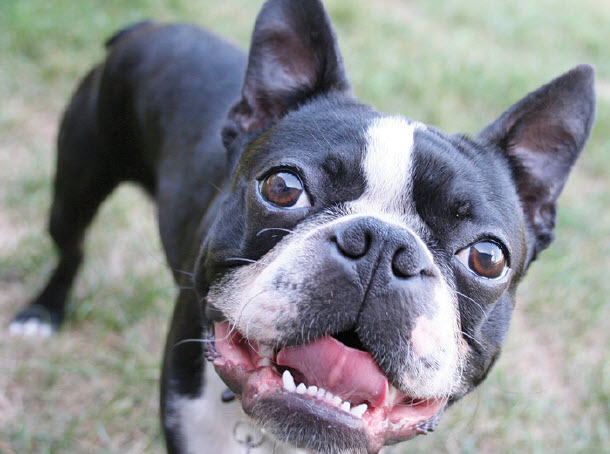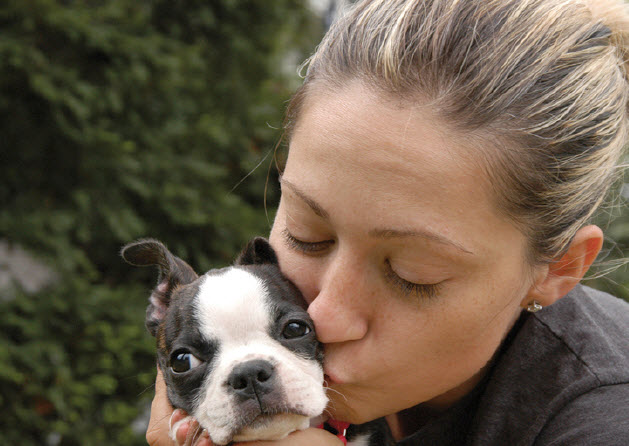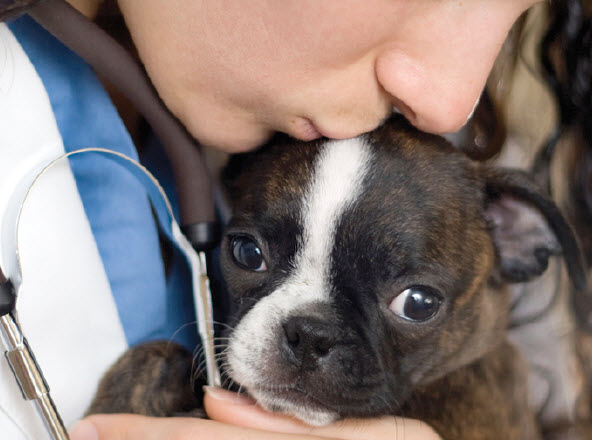
The Boston Breed
Boston Terriers are spunky little bulls! You might recognize these features:
- Intelligent, friendly, and easily won over
- Loves to play games, especially fetch
- Good with kids and other pets
- Quiet—not much of a barker
- Small, but sturdy
- Protective of family: a good watchdog
Chances are, you'll notice these characteristics, too:
- Can be rambunctious and rowdy, especially as a puppy
- Can be gassy and may drool a lot
- Makes a lot of snorting, snuffling, and wheezing noises; may snore
- Can be possessive of toys and food; tends to show dominance
- Exhibits signs of separation anxiety if left alone too much
- Can be difficult to housetrain
 She is a gentle, enthusiastic, and clownish family companion that is willing to be friends with anyone. She can adapt to most living situations provided she is given adequate exercise and early socialization.
She is a gentle, enthusiastic, and clownish family companion that is willing to be friends with anyone. She can adapt to most living situations provided she is given adequate exercise and early socialization.
The Boston Terrier originated in Massachusetts as a companion dog in 1870 from crosses between the white English Terrier and the English Bulldog. They were the first American breed recognized by the American Kennel Club. Also called the “American Gentleman”, Bostons are recognized by their short coats of black, brindle, or seal with white markings, their short tails, and erect ears. Boston Terriers are social butterflies; they love people, activity, and attention. The Boston Terrier can be stubborn at times, but is generally well-mannered and eager to please. The Boston is active and charming and wants nothing more than to be your best friend. The Boston Terrier is a generally healthy breed with an average lifespan of 13-14 years.
Your Boston Terrier's Health
We know that because you care so much about your dog, you want to take good care of her. That is why we have summarized the health concerns we will be discussing with you over the life of your Boston. By knowing about health concerns specific to Boston Terriers, we can tailor a preventive health plan to watch for and hopefully prevent some predictable risks.
Many diseases and health conditions are genetic, meaning they are related to your pet’s breed. There is a general consensus among canine genetic researchers and veterinary practitioners that the conditions we’ve described herein have a significant rate of incidence and/or impact in this breed. That does not mean your dog will have these problems; it just means that she is more at risk than other dogs. We will describe the most common issues seen in Boston Terriers to give you an idea of what may come up in her future. Of course, we can’t cover every possibility here, so always check with us if you notice any unusual signs or symptoms.
This guide contains general health information important to all canines as well as the most important genetic predispositions for Boston Terriers. This information helps you and us together plan for your pet’s unique medical needs. At the end of the article, we have also included a description of what you can do at home to keep your Boston Bull looking and feeling her best. You will know what to watch for, and we will all feel better knowing that we’re taking the best possible care of your pal.
General Health Information for your Boston Terrier
 Dental Disease
Dental Disease
Dental disease is the most common chronic problem in pets, affecting 80% of all dogs by age two. Unfortunately, your Boston Terrier is more likely than other dogs to have problems with her teeth. Dental disease starts with tartar build-up on the teeth and progresses to infection of the gums and roots of the teeth. If we don’t prevent or treat dental disease, your buddy may lose her teeth and be in danger of damage to her kidneys, liver, heart, and joints. In fact, your Boston Terrier's life span may even be cut short by one to three years! We’ll clean your dog’s teeth regularly and let you know what you can do at home to keep those pearly whites clean.
Infections
Boston Terriers are susceptible to bacterial and viral infections — the same ones that all dogs can get — such as parvo, rabies, and distemper. Many of these infections are preventable through vaccination, which we will recommend based on her age, the diseases we see in our area, and other factors.
Obesity
Obesity can be a significant health problem in Boston Terriers. It is a serious disease that may cause or worsen joint problems, metabolic and digestive disorders, back pain, and heart disease. Though it’s tempting to give your pal food when she looks at you with those soulful eyes, you can “love her to death” with leftover people food and doggie treats. Instead, give her a hug, brush her fur or teeth, play a game with her, or perhaps take her for a walk. She’ll feel better, and so will you!
Parasites
All kinds of worms and bugs can invade your Boston Bull's body, inside and out. Everything from fleas and ticks to ear mites can infest her skin and ears. Hookworms, roundworms, heartworms, and whipworms can get into her system in a number of ways: drinking unclean water, walking on contaminated soil, or being bitten by an infected mosquito. Some of these parasites can be transmitted to you or a family member and are a serious concern for everyone. For your canine friend, these parasites can cause pain, discomfort, and even death, so it’s important that we test for them on a regular basis. We’ll also recommend preventive medication as necessary to keep her healthy.
Spay or Neuter
One of the best things you can do for your Boston is to have her spayed (neutered for males). In females, this means we surgically remove the ovaries and usually the uterus, and in males, it means we surgically remove the testicles. Spaying or neutering decreases the likelihood of certain types of cancers and eliminates the possibility of your pet becoming pregnant or fathering unwanted puppies. Performing this surgery also gives us a chance, while your pet is under anesthesia, to identify and address some of the diseases your dog is likely to develop. For example, if your pet needs hip X-rays or a puppy tooth extracted, this would be a good time—it’s more convenient for you and easier on your friend too. Routine blood testing prior to surgery also helps us to identify and take precautions against common problems that increase anesthetic or surgical risk. Don’t worry; we’ll discuss the specific problems we will be looking for when the time arrives.
Genetic Predispositions for Boston Terriers
 Eye Problems
Eye Problems
Not many things have as dramatic an impact on your dog's quality of life as the proper functioning of his eyes. Unfortunately, Boston Terriers can inherit or develop a number of different eye conditions, some of which may cause blindness if not treated right away, and most of which can be extremely painful! We will evaluate his eyes at every examination to look for any signs of concern.
- Cataracts are a common cause of blindness in older Bostons. We’ll watch for the lenses of his eyes to become more opaque—meaning they look cloudy instead of clear—when we examine him. Many dogs adjust well to losing their vision and get along just fine. Surgery to remove cataracts and restore sight may also be an option.
- Glaucoma, an eye condition that affects Boston Terriers and people too, is an extremely painful disease that rapidly leads to blindness if left untreated. Symptoms include squinting, watery eyes, bluing of the cornea (the clear front part of the eye), and redness in the whites of the eyes. Pain is rarely noticed by pet owners though it is frequently there and can be severe. People who have certain types of glaucoma often report it feels like being stabbed in the eye with an ice pick! Yikes! In advanced cases, the eye may look enlarged or swollen like it’s bulging. We’ll perform an annual glaucoma screening to diagnose and start treatment as early as possible. Glaucoma is a medical emergency. If you see symptoms, don’t wait to call us, go to an emergency clinic!
- Dry eye, also known as keratoconjunctivitis sicca or KCS, is common in Boston Terriers. KCS reduces the amount of fluid produced by the tear glands such that they are no longer able to keep the eyes moist. This results in sore, itchy eyes and infections. Symptoms of KCS include a dull, dry appearance or thick discharge from the eyes, squinting, and pawing at the eyes. KCS is a painful condition; please call us immediately if you notice any of these signs, and we’ll conduct a tear test on your pet. If he has this disease, we’ll prescribe ointment that you’ll need to apply for the rest of your dog’s life.
- Because your Boston Bull has eyeballs that naturally protrude, he is more vulnerable to eye injuries. Scrapes or punctures to the cornea (the protective covering on the eyeball) are the most common injuries. Don’t let your pet ride in the car with his head out the window either as this is also a frequent cause of eye injuries. Not only do eye injuries hurt, they can become infected and affect his vision. Call us at (312) 583-1921 right away if your pet has any problems with his eyes. A damaged cornea is painful and should be treated immediately. Medication and sometimes surgery may be required.
Bone and Joint Problems
A number of different musculoskeletal problems have been reported in Boston Terriers. While it may seem overwhelming, each condition can be diagnosed and treated to prevent undue pain and suffering. With diligent observation at home and knowledge about the diseases that may affect your friend's bones, joints, or muscles, you will be able to take great care of him throughout his life.
- Sometimes your Boston's kneecap (patella) may slip out of place. This is called patellar luxation. You might notice that your pet, while running, suddenly picks up a back leg or skips and hops for a few strides. He might then kick his leg out sideways to pop the kneecap back in place. These are common signs of patellar luxation. If the problem is mild and involves only one leg, your friend may not require much treatment beyond arthritis medication. When symptoms are severe, surgery may be needed to realign the kneecap to keep it from luxating further.
- Young Boston Terriers may be prone to a painful degenerative hip condition called Legg-Calve-Perthes disease. The exact cause of this condition is still not completely understood, but it is thought to be caused by a reduced blood supply to the hip, which causes the femoral head (the top of the thigh bone) to become brittle and fracture easily. Usually occurring between six and nine months of age, LCP causes pain and lameness in one or both rear legs, and often requires surgery.
- You’ve probably heard of hip dysplasia, an inherited disease that causes the hip joints to form improperly and leads to arthritis. Hip dysplasia is common in Boston Terriers. You may notice that he has lameness in his hind legs or has difficulty getting up from lying down. We’ll take X-rays of your dog’s joints to identify the disease as early as possible, and we can treat the arthritis — the sooner the better — to avoid discomfort and pain. Surgery is sometimes considered in severe and life-limiting cases of hip dysplasia. And keep in mind that overweight dogs may develop arthritis years earlier than those of normal weight, causing undue pain and suffering.
Spinal Deformities
Boston Terriers are more likely than other canines to be born with spinal deformities, a condition called hemivertebrae, which may lead to spinal cord damage, instability, or disability. We’ll take X-rays when your pet is young to ensure that we identify problems early as symptoms can worsen with age, weight, and sometimes activity. During his life, if he develops back problems, we’ll rule out any other causes, such as a slipped spinal disc or arthritis. If a deformity is diagnosed, we’ll prescribe medication, acupuncture, or rehabilitation as needed.
 Allergies
Allergies
In humans, allergies to pollen, mold, or dust make people sneeze. In dogs, rather than sneezing, allergies make their skin itchy. We call this skin allergy “atopy”, and Bostons often have it. The feet, belly, folds of the skin, and ears are most commonly affected. Symptoms typically start between the ages of one and three and can get worse every year. Licking the paws, rubbing the face, and frequent ear infections are the most common signs of allergies. The good news is that there are many treatment options available for these conditions.
Mange
Demodex is a microscopic mite that lives in the hair follicles of all dogs. Normally a dog’s immune system keeps the mites in check, but some breeds, like your Boston, may develop an overabundance of these mites. In mild cases, pet owners may notice a few dry, irritated, hairless lesions. These often occur on the face or feet and may or may not be itchy. Secondary skin infections may also occur. Prompt veterinary care is important to keep the disease from getting out of hand. Many pets seem to outgrow the problem, while others require lifelong management.
Hair Loss
Both male and female Bostons are prone to genetically patterned baldness. As with balding men, the hair gradually falls out and does not grow back. This hair loss does not cause itchiness, though the skin can sometimes become dry. Affected areas usually include the throat, chest, belly, and the insides of the legs. We’ll conduct tests to rule out treatable problems that present hair loss as a symptom, such hypothyroidism, but if it is true pattern baldness, supplements or hormones may help although there is no cure.
Hyperadrenocorticism (Cushing's)
Cushing's Disease is a malfunction of the adrenal glands that causes them to produce too much steroid hormone. This is a common problem in dogs, and your Boston Bull is more likely than other dogs to be affected. The condition usually develops slowly, and the early signs are easily missed. Symptoms include drinking and urinating more than normal, increased appetite, and reduced activity level followed later by a potbelly, thin skin, and hair loss. Treatment usually includes oral medications, and requires close coordination with us to ensure correct dosing.
Respiratory Distress Syndrome
Respiratory distress syndrome, also known as brachycephalic syndrome, affects dogs with a short nose, like your Boston Terrier. Short-nosed dogs have the same amount of tissue in their noses and throats as longer-nosed dogs, but with less area to contain it. As a consequence, the soft palate at the back of the roof of the mouth is too long and may hang down into the airway. These dogs’ nostrils are often too small, and sometimes the trachea, or windpipe, is narrow and undersized as well. All of these differences can lead to a narrow and obstructed airway such that many of these dogs can barely breathe! Watch for exercise intolerance, loud breathing, coughing, bluish gums, or fainting. With his short nose, your pet is also more likely to develop other problems, such as flatulence from excessive air intake, pneumonia from aspirating food, and heat stroke. In severe cases, surgical correction may be recommended to alleviate airway obstruction.
Heart Disease
Heart failure is a leading cause of death among Boston Terriers in their golden years. Most heart disease in dogs is caused by the weakening or slow deformity of heart valves such that they no longer close tightly; blood then leaks back around these weakened valves, straining the heart. Pets with heart valve disease (sometimes called mitral valve disease) have a heart murmur. If your dog has a heart murmur or outward signs suggesting heart problems, we’ll perform testing to determine the severity of the disease. The same tests will need to be repeated at least every year to monitor the condition. If heart valve disease is diagnosed early, we may be able to prescribe medications that could prolong your pet’s life for many years. Veterinary dental care and fatty acid supplementation can also help prevent heart disease, and weight control can help diminish symptoms.
Cancer
Cancer is a leading cause of death in older dogs. Your Boston Bull will likely live longer than many other breeds and therefore is more prone to get cancer in his golden years. Many cancers are curable by surgical removal, and some types are treatable with chemotherapy. Early detection is critical! We’ll perform periodic diagnostic tests and look for lumps and bumps when we examine your pet.
Epilepsy
There are three types of seizures in dogs: reactive, secondary, and primary. Reactive seizures are caused by the brain's reaction to a metabolic problem like low blood sugar, organ failure, or a toxin. Secondary seizures are the result of a brain tumor, stroke, or trauma. If no other cause can be found, the disease is called primary or idiopathic epilepsy. This problem is often an inherited condition, and Boston Terriers are commonly afflicted. If your friend is prone to seizures, episodes will usually begin between six months and three years of age. An initial diagnostic workup may help find the cause. Lifelong medication is usually necessary to help keep seizures under control with periodic blood testing required to monitor side effects and efficacy. If your dog has a seizure, carefully prevent him from injuring himself, but don't try to control his mouth or tongue. It won't help him, and he may bite you accidentally! Note the length of the seizure, and call us or an emergency hospital.
Reproductive Difficulties
Breeds with a large head and small pelvis are more prone to difficulties during the birthing process. The female’s pelvis may be too small to pass the puppies’ heads and a C-section is often required for her health and that of her puppies. If you are interested in breeding your Boston Bull, speak with us first. We can help you make an informed decision based on the body conformations of both sire and dam.
Deafness
Heritable deafness has been noted in some Boston Bull bloodlines, so if his ears are healthy and he's still ignoring you, a more thorough hearing workup may be needed, including brainwave analysis, if indicated. If you suspect he may not be hearing as well as he should, schedule an appointment with us right away as the problem could also be caused by a severe ear infection.
Taking Care of Your Boston Terrier at Home
 Much of what you can do to keep your dog happy and healthy is common sense, just like it is for people. Watch her diet, make sure she gets plenty of exercise, regularly brush her teeth and coat, and call us or a pet emergency hospital when something seems unusual (see “What to Watch For” below). Be sure to adhere to the schedule of examinations and vaccinations that we recommend for her. This is when we’ll give her the necessary “check-ups” and test for diseases and conditions that are common in Bostons. Another very important step in caring for your pet is signing up for pet health insurance. There will certainly be medical tests and procedures she will need throughout her life and pet health insurance will help you cover those costs.
Much of what you can do to keep your dog happy and healthy is common sense, just like it is for people. Watch her diet, make sure she gets plenty of exercise, regularly brush her teeth and coat, and call us or a pet emergency hospital when something seems unusual (see “What to Watch For” below). Be sure to adhere to the schedule of examinations and vaccinations that we recommend for her. This is when we’ll give her the necessary “check-ups” and test for diseases and conditions that are common in Bostons. Another very important step in caring for your pet is signing up for pet health insurance. There will certainly be medical tests and procedures she will need throughout her life and pet health insurance will help you cover those costs.
Routine Care, Diet, and Exercise
Build her routine care into your schedule to help your Boston Bull live longer, stay healthier, and be happier during her lifetime. We cannot overemphasize the importance of a proper diet and exercise routine.
- Supervise your pet as you would a toddler. Keep doors closed, pick up after yourself, and block off rooms as necessary. This will keep her out of trouble and away from objects she shouldn’t put in her mouth.
- Brush her coat as needed, at least weekly. Her facial and tail-base folds should be kept clean and dry to prevent infections.
- Boston Terriers generally have good teeth, and you can keep them perfect by brushing them at least twice a week!
- Clean her ears weekly, even as a puppy. Don’t worry—we’ll show you how!
- She is well suited for apartment living; she will need a daily walk and regular inside play.
- She is a sensitive dog and doesn't do well with harsh training methods or punishment; always end training on a positive note.
- She can be sensitive to temperature extremes; avoid prolonged weather exposure and be very alert to the signs of heat stress.
- Keep your dog’s diet consistent and don’t give her people food.
- Feed a high-quality diet appropriate for her age.
- Exercise your dog regularly, but don’t overdo it at first.
What to Watch For
Any abnormal symptom could be a sign of serious disease or it could just be a minor or temporary problem. The important thing is to be able to tell when to seek veterinary help and how urgently. Many diseases cause dogs to have a characteristic combination of symptoms, which together can be a clear signal that your Boston Terrier needs help.
Office Calls
Give us a call for an appointment if you notice any of these types of signs:
- Change in appetite or water consumption
- Tartar build-up, bad breath, red gums, or broken teeth
- Itchy skin (scratching, chewing, or licking); hair loss
- Lethargy, mental dullness, or excessive sleeping
- Fearfulness, aggression, or other behavioral changes
- Dry, scaly, sometimes itchy hairless patches on face or paws
- Drinks and urinates more, eats more; potbelly, poor haircoat
- Easily startled, no reaction to unseen sounds
Emergencies
Seek medical care immediately if you notice any of these types of signs:
- Scratching or shaking the head, tender ears, or ear discharge
- Inability or straining to urinate; discolored urine
- Cloudiness, redness, itching, or any other abnormality involving the eyes
- Loud breathing, tires easily at exercise
- Coughing, especially at night or upon rising after sleeping; rapid breathing at rest
- Any abnormal shaking, trembling, or excessive involuntary tremors
